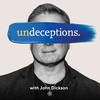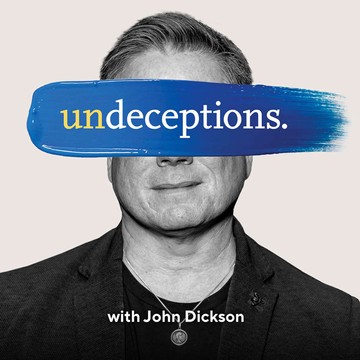

Undeceptions with John Dickson
Undeceptions Ltd
Every week on Undeceptions we’ll explore some aspect of life, faith, history, culture, or ethics that is either much misunderstood or mostly forgotten. With the help of people who know what they’re talking about, we’ll be trying to ‘undeceive ourselves’ and let the truth ‘out’.
Episodes
Mentioned books

Mar 15, 2020 • 37min
13. It's Cancer
In this episode we’re delving into that frightening world. According to the World Health Organization, cancer is the second leading cause of death internationally, accounting for an estimated 9.6 million fatalities in 2018 - that’s 1 in 6 deaths. Cancer is an undiscriminating disease. It can appear in almost any part of the body, and any age group. Each year, 300,000 cases of cancer are diagnosed in children alone. And the costs for those who can pay for treatments and preventative measures are staggering - cancer costs the world economy 1.16 trillion US dollars a year. But cancer isn’t just a medical battleground, it’s a spiritual one as well. Through the ages, myriad human voices have cried out, “My God, why!?" How do people who reckon there is some kind of good God in the world - which surveys say is most human beings - cope with cancer in the world? Meet Ben Shaw and his wife Karen who heard those two words in the title, and the epic faith journey they travelled together.LINKSFind out more about Ben Shaw through his page at The Boathouse Church, PutneyThis episode is brought to you by Zondervan Academic and its new book The New Testament in Its World by N. T. Wright and Michael BirdA special just for Undeceptions listeners! Get free access to Zondervan Academic's Master Lectures for 14 days, and then save 25% for the next 6 months. Just type in the code UNDECEPTIONS at the check-out.Ridley College, where John lectures in Public ChristianityThe podcast Salt (conversations with Jenny Salt) is available on The Eternity Podcast Network

Mar 10, 2020 • 45sec
It's almost here!
The return of Undeceptions for 2020, kicking off with God and cancer, a better way of reading Genesis, woman leading the charge in explaining Christianity, Easter myths exploded and proof the faith you grow up with isn't the final word on what you believe. Plus much, much more! Let the Undeceptions begin... Monday, March 16.

Feb 2, 2020 • 15min
First Church Service Single
It's February 4, and the anniversary of Australia's first church service. But this wasn't a morality lesson from the chaplain to the prison colony. The Rev. Richard Johnson had something much more significant on his mind.

Jan 25, 2020 • 7min
Australia Day Single
On the day we commemorate the history and character of our nation, it may be worth considering how we build healthy, respectful lamenting into our national celebrations.

Dec 23, 2019 • 8min
Christmas Single
This Christmas, as you rightly enjoy the good things God's given you and share them with your nearest and dearest, spare a moment to consider how your generosity might spread further afield. Links that might prove helpful:World VisionInternational Justice MissionAnglican AidOpen Doors AustraliaTear AustraliaSave The Children

Dec 3, 2019 • 2min
BONUS Undeceptions Theme
Thanks for being great supporters of the first season of Undeceptions! We hope you enjoy this little gift from us, and have a happy Christmas with your loved ones and the God who made this all possible.Yours in all truth,John, Kaley, Bella and Mark

Dec 2, 2019 • 45min
12. First Noel
Jesus was born in a manger, right? But what does that mean exactly? And how about that inn? Or the star hovering over the stable? How does history address our most cherished images of the birth of the King of Kings? And what did The Life Of Brian get right? Join John as he undeceives us about everything that can and can't be said about the birth of Jesus. Thanks to our season sponsor – Selah – for all your travel needs, whether you’re a doubter or a believer. Find out more at myselah.com.au.Links related to this episode:Read John's Nativity Naivete for an account of how the 'Quirinius problem' is resolved by historians, as well as many other common misconceptions about supposed historical problems in the Christmas story.For a more general summary of the historical truths of the Christmas story, there's Truth In The Story Of ChristmasFor those wanting to dig deeper into the historical evidence for Jesus' existence, John also wrote this reply to an assertion that the baby in a manger wasn't a real person for ABC Religion & Ethics.And since it's that time of year, you might also want to have a look at John's article, Halloween Vs. Christmas, discussing the historical basis for both.Send us a questionOh boy, does John love questions. So don’t be afraid to send them in. In season one, we’ll be dedicating an episode or two for John to answer all your burning questions about Christianity. Want to know something more about a previous episode? Or perhaps you’ve got a question about faith that you’ve been struggling to find an answer for? Let us know here, or leave your question as a voicemail at 02 9870 5678.

Nov 25, 2019 • 51min
11. Question Answer I
Each week of our first season of Undeceptions, we've asked you to tell us some of the things you'd like to be 'undeceived' about. This episode John Dickson tackles the top questions sent in, covering everything from questions raised by our various guests to crackers you've come up with on your own.Press play to hear more about whether Islam actually invented science, why historians still reject the idea of a resurrection, and what the difference is between New Testament and Old Testament Miracles. Plus West Wing references and Jesus own 'top questions' to ask!Thanks to our season sponsor - Selah - for all your travel needs, whether you're a doubter or a believer. Find out more at myselah.com.au.Links related to this episode:Curiosity aroused by others' questions? Easy links to...Episode 1 - Old Papers, with Brendan HaugEpisode 2 - Football Free, with the Greenbay PackersEpisode 6 - Rational Universe, with Ard LouisEpisode 7 - Gospel Truth, with Peter WilliamsJohn refer's to the 'post hoc ergo proctor hoc' fallacy. Did he leave you in the dust? Here's a video that explains the ideaBut if you'd prefer Jed Bartlett to explain it to you, you can find it hereAnd check out the beautiful new Undeceptions web site!Want to send John a question for our next Q and A? Here's the place to do it! Send us a questionOh boy, does John love questions. So don’t be afraid to send them in. In season one, we’ll be dedicating an episode or two for John to answer all your burning questions about Christianity. Want to know something more about a previous episode? Or perhaps you’ve got a question about faith that you’ve been struggling to find an answer for? Let us know here, or leave your question as a voicemail at 02 9870 5678.

Nov 18, 2019 • 33min
10. Historical Jesus
This episode, we've put John Dickson in the hot seat to talk about his new book: Is Jesus History. Anita Savage is our guest host, and she grills John on one of the greatest questions out there: did Jesus really exist?Thanks to our season sponsor - Selah - for all your travel needs, whether you're a doubter or a believer. Find out more at myselah.com.au.Links related to this episode:Get John Dickson's latest book Is Jesus History? Read more about the supposed 'lost tomb of Jesus' in this CNN report. And watch James Cameron's documentary here.Read more about the 'lost gospel of Judas' from the National Geographic Society.Jeffrey Archer's fiction book, The Gospel According to JudasAfter The Da Vinci Code, John Dickson wrote several articles responding to some of the conspiracies theories that surrounded the book and the life of Jesus. Here's one of them on The Secret Gospels.Read the article from Time Magazine listing Jesus as the most influential person of all time.In Episode 7 of Undeceptions, John interviewed Peter Williams, author of Can We Trust the Gospels. You should definitely go back and listen to that episode if you enjoyed this one!Get to know our guest hostAnita Savage is a TV and radio journalist who has worked for 2UE, Sky News, Channel 9, Bloomberg Television and ABC TV and radio. In 2019, Anita joined the Hope Media team to lead the new Hope Media News Service. She joins us for this episode of Undeceptions as guest host, interviewing John Dickson.Send us a questionOh boy, does John love questions. So don’t be afraid to send them in. In season one, we’ll be dedicating an episode or two for John to answer all your burning questions about Christianity. Want to know something more about a previous episode? Or perhaps you’ve got a question about faith that you’ve been struggling to find an answer for? Let us know here, or leave your question as a voicemail at 02 9870 5678.

Nov 11, 2019 • 38min
9. Dominus Illuminatio
When Sarah first arrived at Cambridge on a scholarship, and then later took a job at Oxford, she thought Christians were anti-intellectual.And perhaps that’s what we’ve come to expect. Smart people have no time - no headspace - for God. They know too much. They think too deeply for the ‘shallows’ of theology.This episode, we’re talking with people who’ve witnessed the opposite. Universities like Oxford and Cambridge are melting pots, where people can find their beliefs - or unbelief - turned upside down, just like Sarah.Thanks to our season sponsor - Selah - for all your travel needs, whether you're a doubter or a believer. Find out more at myselah.com.au.Links related to this episode:Read more of Sarah's conversion to Christianity during her studies here.Check out Vaughan Robert's ministry at St Ebbe's in Oxford.Read Peter Harrison's The Fall of Man and the Foundations of ScienceFind out more about philosopher Peter SingerJohn Dickson's 5 minute Jesus in this episode is all about Christianity and the Apostles' Creed. Learn more about the creed here.Read more about CS Lewis' conversion to Christianity while at OxfordGet GK Chesterton's book The Everlasting ManMore on Oxford banning the Christian Union at Fresher's Week in 2017Get to know our guestsDr Sarah Irving-Stonebraker is senior lecturer in Modern European History at Western Sydney University. She was awarded a PhD in History from Cambridge University in 2007.Vaughan Roberts is Rector of St Ebbe's Church in Oxford. He studied law at Cambridge University and theology at Wycliffe Hall in Oxford before entering ministry. Roberts is also Director of the Proclamation Trust, an organisation that encourages and equips Bible teachers. He is a popular conference speaker and author of several books.Send us a questionOh boy, does John love questions. So don’t be afraid to send them in. In season one, we’ll be dedicating an episode or two for John to answer all your burning questions about Christianity. Want to know something more about a previous episode? Or perhaps you’ve got a question about faith that you’ve been struggling to find an answer for? Let us know here, or leave your question as a voicemail at 02 9870 5678.


